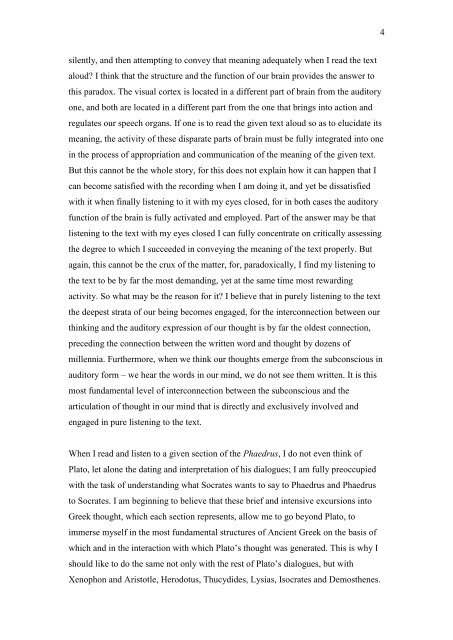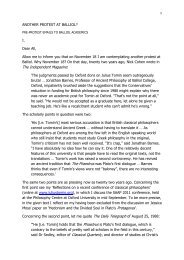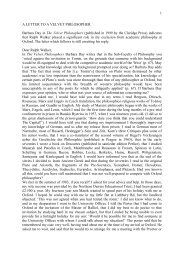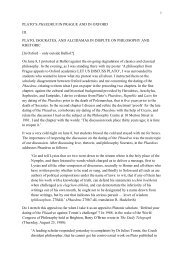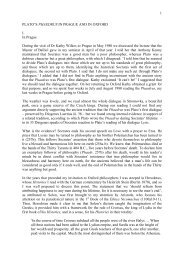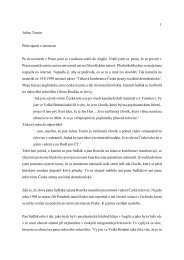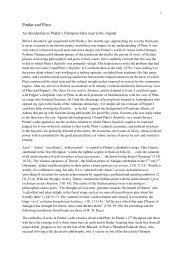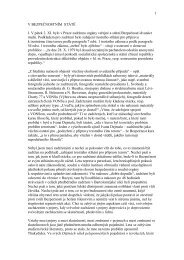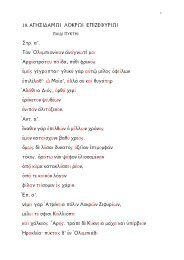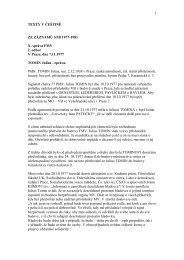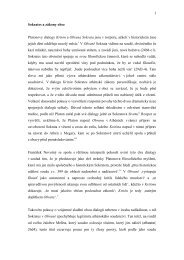Introduction to Plato read in Greek - Julius Tomin
Introduction to Plato read in Greek - Julius Tomin
Introduction to Plato read in Greek - Julius Tomin
Create successful ePaper yourself
Turn your PDF publications into a flip-book with our unique Google optimized e-Paper software.
4<br />
silently, and then attempt<strong>in</strong>g <strong>to</strong> convey that mean<strong>in</strong>g adequately when I <strong>read</strong> the text<br />
aloud? I th<strong>in</strong>k that the structure and the function of our bra<strong>in</strong> provides the answer <strong>to</strong><br />
this paradox. The visual cortex is located <strong>in</strong> a different part of bra<strong>in</strong> from the audi<strong>to</strong>ry<br />
one, and both are located <strong>in</strong> a different part from the one that br<strong>in</strong>gs <strong>in</strong><strong>to</strong> action and<br />
regulates our speech organs. If one is <strong>to</strong> <strong>read</strong> the given text aloud so as <strong>to</strong> elucidate its<br />
mean<strong>in</strong>g, the activity of these disparate parts of bra<strong>in</strong> must be fully <strong>in</strong>tegrated <strong>in</strong><strong>to</strong> one<br />
<strong>in</strong> the process of appropriation and communication of the mean<strong>in</strong>g of the given text.<br />
But this cannot be the whole s<strong>to</strong>ry, for this does not expla<strong>in</strong> how it can happen that I<br />
can become satisfied with the record<strong>in</strong>g when I am do<strong>in</strong>g it, and yet be dissatisfied<br />
with it when f<strong>in</strong>ally listen<strong>in</strong>g <strong>to</strong> it with my eyes closed, for <strong>in</strong> both cases the audi<strong>to</strong>ry<br />
function of the bra<strong>in</strong> is fully activated and employed. Part of the answer may be that<br />
listen<strong>in</strong>g <strong>to</strong> the text with my eyes closed I can fully concentrate on critically assess<strong>in</strong>g<br />
the degree <strong>to</strong> which I succeeded <strong>in</strong> convey<strong>in</strong>g the mean<strong>in</strong>g of the text properly. But<br />
aga<strong>in</strong>, this cannot be the crux of the matter, for, paradoxically, I f<strong>in</strong>d my listen<strong>in</strong>g <strong>to</strong><br />
the text <strong>to</strong> be by far the most demand<strong>in</strong>g, yet at the same time most reward<strong>in</strong>g<br />
activity. So what may be the reason for it? I believe that <strong>in</strong> purely listen<strong>in</strong>g <strong>to</strong> the text<br />
the deepest strata of our be<strong>in</strong>g becomes engaged, for the <strong>in</strong>terconnection between our<br />
th<strong>in</strong>k<strong>in</strong>g and the audi<strong>to</strong>ry expression of our thought is by far the oldest connection,<br />
preced<strong>in</strong>g the connection between the written word and thought by dozens of<br />
millennia. Furthermore, when we th<strong>in</strong>k our thoughts emerge from the subconscious <strong>in</strong><br />
audi<strong>to</strong>ry form – we hear the words <strong>in</strong> our m<strong>in</strong>d, we do not see them written. It is this<br />
most fundamental level of <strong>in</strong>terconnection between the subconscious and the<br />
articulation of thought <strong>in</strong> our m<strong>in</strong>d that is directly and exclusively <strong>in</strong>volved and<br />
engaged <strong>in</strong> pure listen<strong>in</strong>g <strong>to</strong> the text.<br />
When I <strong>read</strong> and listen <strong>to</strong> a given section of the Phaedrus, I do not even th<strong>in</strong>k of<br />
Pla<strong>to</strong>, let alone the dat<strong>in</strong>g and <strong>in</strong>terpretation of his dialogues; I am fully preoccupied<br />
with the task of understand<strong>in</strong>g what Socrates wants <strong>to</strong> say <strong>to</strong> Phaedrus and Phaedrus<br />
<strong>to</strong> Socrates. I am beg<strong>in</strong>n<strong>in</strong>g <strong>to</strong> believe that these brief and <strong>in</strong>tensive excursions <strong>in</strong><strong>to</strong><br />
<strong>Greek</strong> thought, which each section represents, allow me <strong>to</strong> go beyond Pla<strong>to</strong>, <strong>to</strong><br />
immerse myself <strong>in</strong> the most fundamental structures of Ancient <strong>Greek</strong> on the basis of<br />
which and <strong>in</strong> the <strong>in</strong>teraction with which Pla<strong>to</strong>’s thought was generated. This is why I<br />
should like <strong>to</strong> do the same not only with the rest of Pla<strong>to</strong>’s dialogues, but with<br />
Xenophon and Aris<strong>to</strong>tle, Herodotus, Thucydides, Lysias, Isocrates and Demosthenes.


